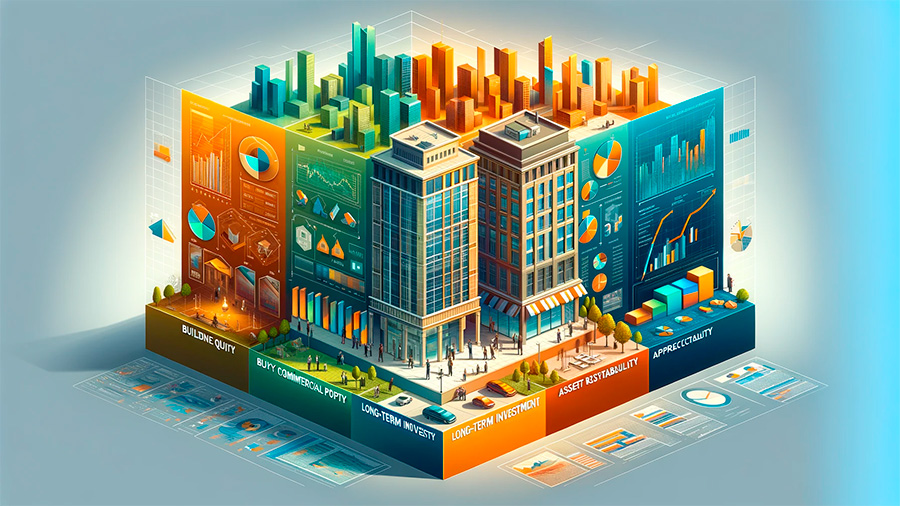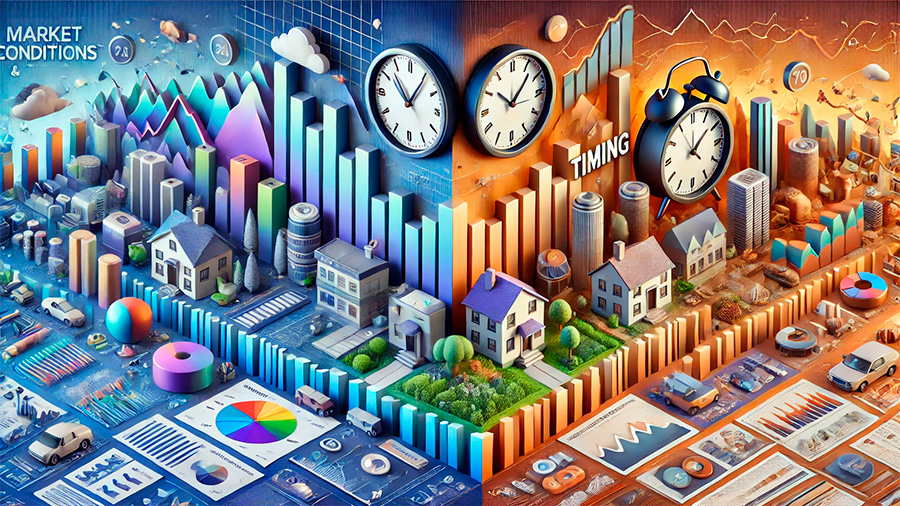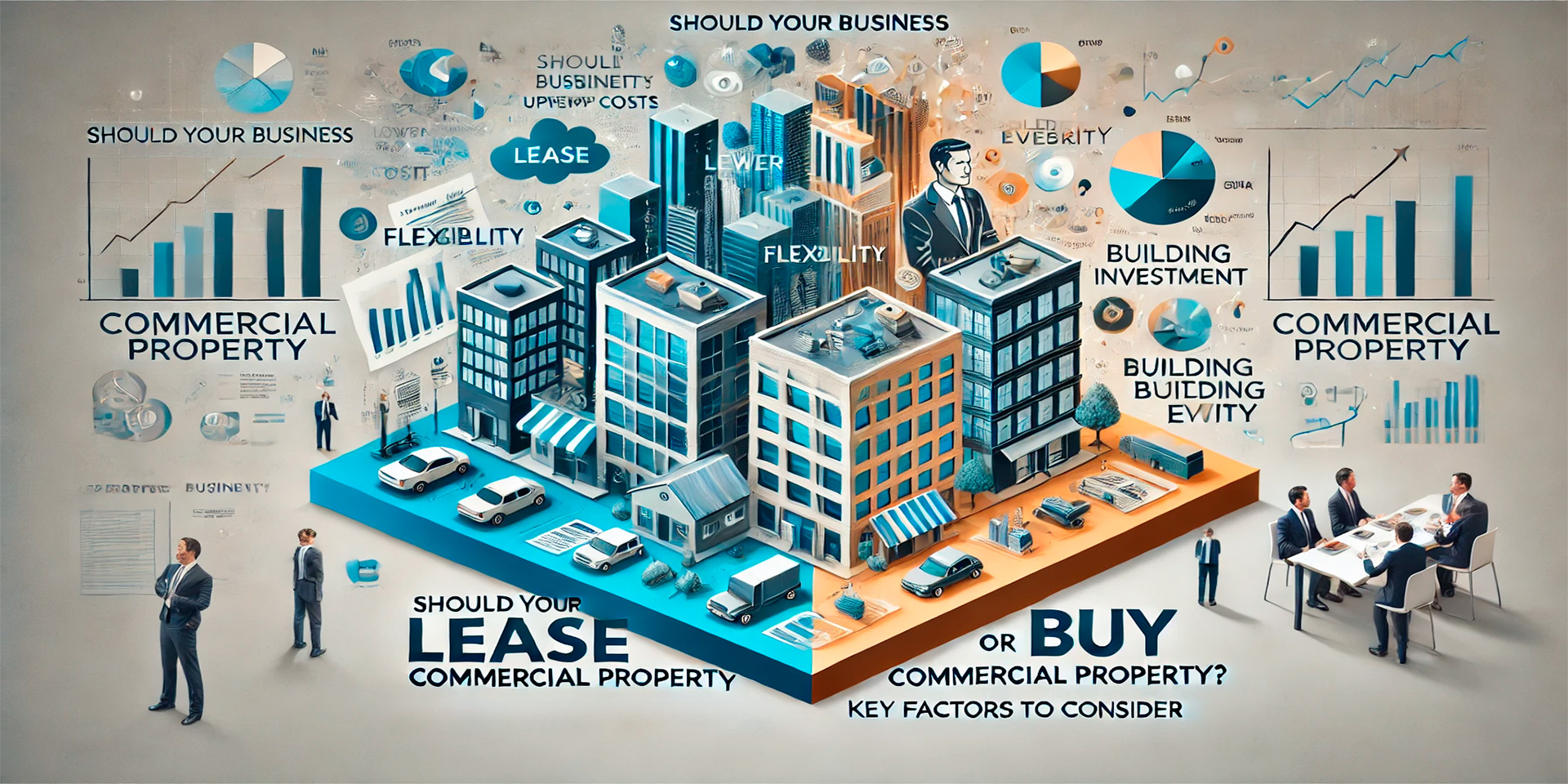One of the most important decisions businesses face is whether to lease or buy commercial property. Both options come with distinct advantages and disadvantages, and the right choice largely depends on your business’s financial situation, long-term goals, and market conditions. In today’s evolving commercial real estate market, understanding the pros and cons of leasing versus buying is essential for making a decision that supports your business’s growth and stability. This article will guide you through the key factors to consider when deciding between leasing and buying commercial property.
Leasing Commercial Property: Flexibility and Lower Upfront Costs
Leasing is a popular option for businesses that need flexibility and want to minimize their upfront financial commitment. By leasing a commercial space, your business can operate from a prime location without the need for a large capital investment or long-term obligations. Here are some of the main benefits of leasing:
Lower Initial Costs
One of the biggest advantages of leasing commercial property is the significantly lower upfront costs compared to buying. When leasing, businesses typically pay a security deposit and the first month’s rent, which is much less expensive than the down payment and closing costs required for purchasing property. This can free up capital that can be used for other business needs, such as inventory, staffing, or marketing.
For startups or businesses with limited cash flow, leasing offers an affordable way to secure a prime location without the burden of taking on significant debt. Leasing also eliminates the need for long-term financial commitments associated with property ownership, such as property taxes, insurance, and maintenance costs.
Flexibility and Scalability
Leasing provides businesses with greater flexibility, particularly if they anticipate growth or changes in their operational needs. Commercial leases typically range from one to five years, and many leases offer the option to renew or expand into additional space if needed. This flexibility allows businesses to adjust their space requirements based on growth, downsizing, or relocation needs.
For businesses in industries that are prone to rapid changes, leasing can be a more practical solution. For example, tech companies or retail stores that may need to scale up or down quickly can benefit from the flexibility of leasing, as it allows them to move or expand without being tied to a long-term investment in a property that may no longer suit their needs.
Maintenance and Operational Costs
In a lease agreement, many of the operational and maintenance responsibilities are shifted to the landlord. Depending on the lease type (gross or net lease), the landlord may cover property taxes, building insurance, and common area maintenance. This reduces the burden on businesses to handle property upkeep, allowing them to focus on their core operations.
By leasing, businesses can avoid the time and expense of managing repairs, building maintenance, and other property-related responsibilities. This can be particularly advantageous for small business owners who may not have the resources to maintain a commercial property on their own.

Buying Commercial Property: Long-Term Investment and Stability
Buying commercial property can be a strategic move for businesses looking to establish long-term stability and build equity. While the upfront costs and responsibilities of ownership are higher, purchasing property can offer significant financial and operational benefits over time. Here are some of the key advantages of buying:
Building Equity and Asset Appreciation
One of the primary benefits of buying commercial property is the opportunity to build equity over time. As you make mortgage payments, you gradually pay down the principal on the loan, increasing your ownership stake in the property. Additionally, commercial properties often appreciate in value, particularly in desirable locations. This means that your investment could grow over time, providing your business with a valuable asset.
If you choose to sell the property in the future, you may be able to profit from the appreciation, or you could use the equity to secure financing for other business opportunities. For many businesses, property ownership is a way to build long-term wealth and financial security.
Predictable Costs
When you buy a property, your mortgage payments remain relatively stable over the long term, especially if you have a fixed-rate loan. This can provide financial predictability, allowing you to better forecast and manage your business’s budget. In contrast, leasing often comes with the risk of rent increases when your lease term ends, which can disrupt cash flow and force businesses to move if rents become unaffordable.
By owning the property, businesses gain control over their space without the uncertainty of rising rental costs. This predictability can be especially beneficial for businesses in stable industries that plan to remain in the same location for the long term.
Customization and Control
When you own a property, you have full control over how the space is used and modified. This means you can make significant improvements, customize the layout, and tailor the space to meet your business’s specific needs. For some businesses, the ability to make structural changes or invest in custom renovations is crucial to their operations.
In contrast, leasing often comes with restrictions on how the space can be altered, as landlords typically set limits on the types of modifications tenants can make. For businesses that require specialized equipment, customized layouts, or unique branding, owning the property may provide the freedom needed to create an ideal work environment.
Financial Considerations: Leasing vs. Buying
The decision to lease or buy commercial property is heavily influenced by your business’s financial situation. It’s important to carefully assess the financial pros and cons of each option to determine which is the best fit for your current and future needs.
When leasing, the upfront costs are lower, and the tax deductions are often more immediate, as you can write off lease payments as a business expense. This can provide a short-term financial benefit, particularly for businesses with limited cash flow or those that need to prioritize other investments.
However, leasing does not allow businesses to build equity or benefit from property appreciation. Over the long term, the money spent on rent does not result in ownership, meaning there’s no return on that investment. Additionally, rent increases can lead to higher costs down the line, which may impact your ability to remain in the same location.
Buying commercial property requires a larger upfront investment, including a down payment, closing costs, and ongoing maintenance expenses. However, the long-term financial benefits of property ownership can outweigh the initial costs. Property owners can take advantage of tax deductions for mortgage interest, depreciation, and property-related expenses. Additionally, owning a property can provide a valuable asset that appreciates over time, adding to your business’s overall financial portfolio.

Market Conditions and Timing
Market conditions play a significant role in the decision to lease or buy commercial property. In a buyer’s market, where property prices are lower and interest rates are favorable, purchasing a property can be a smart investment. On the other hand, in a competitive seller’s market with high property prices, leasing may be a more financially sound option, allowing your business to secure a prime location without the burden of purchasing at inflated prices.
Interest rates also influence the cost of buying property. Low interest rates make it more affordable to finance a commercial property purchase, as lower rates reduce monthly mortgage payments. If interest rates are rising, leasing may be the better choice, as the cost of borrowing becomes more expensive, making buying less attractive.
Conclusion: Choosing the Right Option for Your Business
Deciding whether to lease or buy commercial property is a major decision that depends on your business’s financial health, long-term goals, and operational needs. Leasing offers flexibility, lower upfront costs, and reduced responsibility for property maintenance, making it ideal for businesses seeking short-term solutions or those with limited cash flow. Buying, on the other hand, provides long-term stability, the opportunity to build equity, and greater control over the property, making it a strong option for businesses looking to invest in their future.
Ultimately, the decision should be based on a careful evaluation of your business’s current financial situation and future growth plans. By considering the pros and cons of each option, you can make an informed decision that aligns with your business’s objectives in today’s market.






